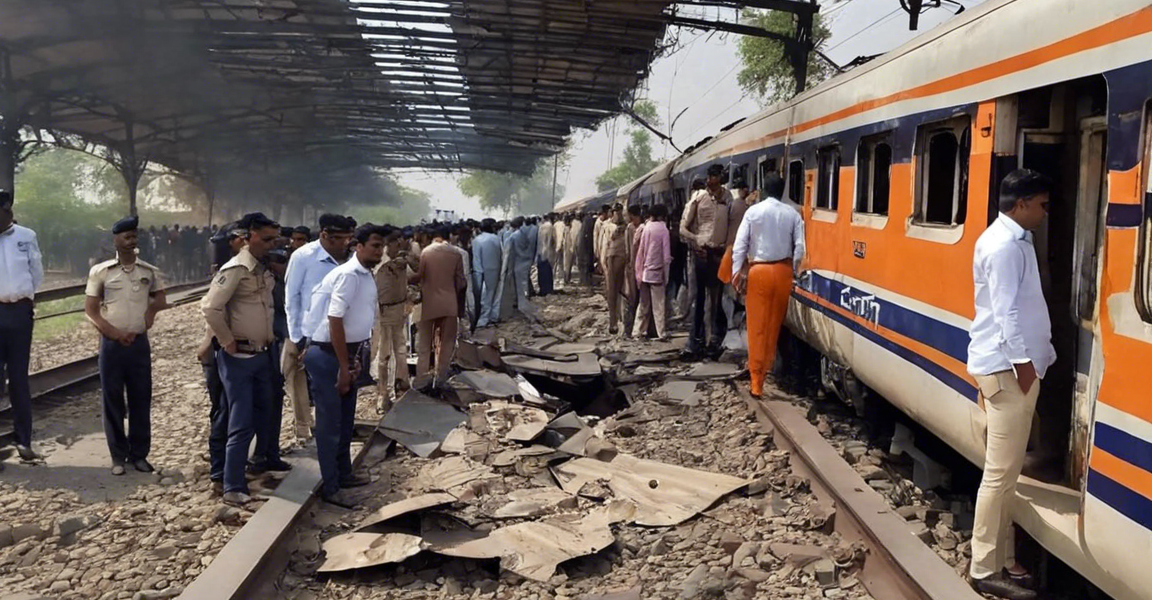On the fateful early morning of April 8th, 2022, a devastating train accident unfolded in Mathura, India, leaving a trail of destruction and despair. The tragic incident occurred when a passenger train derailed near Mathura Junction, resulting in the loss of dozens of lives and injuring many others. The train, which was en route from Delhi to Mathura, derailed due to reasons yet to be fully ascertained, plunging several coaches off the tracks and creating a scene of chaos and horror.
Immediate Response and Rescue Efforts
In the aftermath of the accident, the local authorities, along with emergency response teams and volunteers, quickly mobilized to begin rescue operations. The injured were rushed to nearby hospitals for urgent medical attention, while the debris clearance and recovery of victims’ bodies commenced amidst a somber and tense atmosphere. The rescue efforts were challenging due to the mangled wreckage and the need to swiftly locate and aid those trapped in the train compartments.
Impact on the Community
The Mathura train accident has had a profound impact on the local community, with families and loved ones of the victims plunged into mourning and shock. The loss of lives and the physical and emotional trauma inflicted on survivors have left scars that will take time to heal. The incident has also raised questions about railway safety measures and the need for stringent protocols to prevent such tragedies from recurring.
Investigating the Cause
As authorities delve into the details of the Mathura train accident, investigations are being carried out to determine the exact cause of the derailment. Factors such as track maintenance, speed limits, mechanical failures, and human error are being scrutinized to ascertain the sequence of events that led to this catastrophic incident. Identifying the root cause is crucial not only for understanding what went wrong but also for implementing preventive measures to avert similar accidents in the future.
Support and Solidarity
In the wake of the tragedy, an outpouring of support and solidarity has been witnessed from various quarters. Local communities, NGOs, and charitable organizations have come forward to offer assistance to the affected individuals and families. The spirit of compassion and unity displayed in the face of adversity highlights the resilience and empathy that bind communities together in times of crisis.
Ensuring Accountability and Justice
As the investigation unfolds and the facts surrounding the Mathura train accident come to light, the quest for accountability and justice for the victims and their families gains prominence. Holding accountable those responsible for lapses in safety protocols or negligence that contributed to the tragedy is paramount for ensuring that such incidents are not repeated. The legal and administrative proceedings following the accident will play a crucial role in bringing closure to the affected parties and instilling a sense of accountability in railway operations.
Lessons Learned and Moving Forward
Tragic incidents like the Mathura train accident serve as poignant reminders of the fragility of life and the paramount importance of ensuring safety in all modes of public transportation. The lessons learned from this tragedy must be translated into concrete actions that prioritize passenger safety, infrastructure maintenance, and emergency preparedness. By learning from past mistakes and instituting robust safety mechanisms, authorities can mitigate risks and safeguard the lives of millions who rely on railways for their daily commute.
FAQs (Frequently Asked Questions)
Q: What caused the Mathura train accident?
A: The exact cause of the Mathura train accident is still under investigation, with factors such as track maintenance, speed limits, mechanical failures, and human error being scrutinized.
Q: How many lives were lost in the Mathura train accident?
A: The Mathura train accident resulted in the tragic loss of dozens of lives, with many others sustaining injuries of varying degrees.
Q: What are the immediate response measures taken after the accident?
A: Following the accident, local authorities, emergency response teams, and volunteers swiftly mobilized for rescue operations, attending to the injured and coordinating debris clearance efforts.
Q: How can communities support the victims and families affected by the tragedy?
A: Communities can extend support through donations, volunteering, offering counseling services, and standing in solidarity with the affected individuals and families during their time of grief.
Q: What lessons can be learned from the Mathura train accident to enhance railway safety?
A: The Mathura train accident underscores the need for robust safety measures, regular infrastructure inspections, stringent adherence to speed regulations, and continuous training to prevent similar tragedies in the future.
As the Mathura community grapples with the aftermath of this tragic incident, the road to recovery and resilience will be a challenging one. It is incumbent upon all stakeholders – from authorities to citizens – to work together in promoting safety, accountability, and support for those affected by the tragedy. By honoring the memory of the lives lost in the Mathura train accident with meaningful action and solidarity, we can strive to prevent such heart-wrenching events from casting a shadow on our collective conscience.




